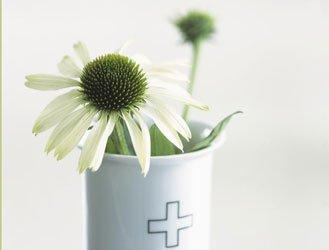Managing a relapse during a chronic illness
Refunds from Secu: What will change
In my medicine cabinet, there is ...
Pitfalls to avoid in our children
Change doses or follow an old treatment
This is the most dangerous form of self-medication. Even if the symptoms are similar, nothing says that it is the same affection. It's not much better if we "hack" the recommendations of the manufacturer. Once and for all, know that you can not heal faster by increasing the recommended doses; there is a risk of poorly tolerating treatment. On the other hand, side effects will not be avoided by reducing the doses, but the treatment will be unlikely to be effective (do nothing). Finally, if you take your medication at any time - for example, an anti-inflammatory upon waking - you increase the risk of side effects. While the same dose taken in the evening, in the middle of the meal, according to the suggestions of the manufacturer, would have been as effective on inflammation, but less troublesome for the digestive system ...
Limitations: One should never self-medicate with prescription-only treatments . Only those who are delivered without a prescription are chosen, provided that they respect their dosage and duration. If the disorder persists beyond 48 hours, if it worsens in the meantime, if new symptoms appear or if they start again when the treatment is stopped: it is imperative to consult. This is also true in homeopathy. Even if the granules are well tolerated, we avoid taking them for weeks. Be aware that inadequate homeopathic treatment taken over the long term can trigger the symptoms it is supposed to stop. A height!
What you can do: During a consultation with your doctor, you establish with him the list of medications that may be needed. He is in the best position to know our risk areas because of our way of life and our history.
Managing a relapse during a chronic illness
In case of self-management of a relapsing disease whose symptoms and diagnosis are known by heart, because the doctor has explained the procedure to follow, it is still self-medication. But as we have been educated for this, it is also one of the safest!
The limits: we must stick to what we know - for example, runny noses and sneezes in salvos in case of allergic rhinitis - and consult without delay if the situation takes an unusual turn. It is no longer a question of self-medication when there is urgency, that is to say the sudden appearance of a new symptom, even if it lasted only a few seconds. Nor should one self-medicate when a banal pain takes an unexpected amplitude. In other words, in the face of acute pain, one does not try to take a powerful analgesic. If the pain does not give way with a basic analgesic, it is no longer a minor problem: we call the 112 or the 15 !
What we can do: define in advance with the doctor who follows us for this chronic condition what are the symptoms that need to be seen again because they sign a new stage in the disease.
Refunds from Secu: What will change
" 10 € maximum when we are not reimbursed : that's what the French spend today for a one-time problem. If it costs them more, they go through their doctor to be reimbursed, "said Professor Alain Baumelou . Also, in his report on self-medication given to the Ministry of Health , he recommends no longer refund some drugs available over-the-counter, as our European neighbors are already doing. According to an estimate by the French Pharmaceutical Industry Association for Responsible Self-Medication ( Afipa ), if 5% of medicines sold on prescription were self-medication, Social Security could save 2.5 billion euros per year: a real breath of fresh air !
To read
"The guide of self-medication", by Professor Alain Baumelou , and Dr. Loïc Etienne , emergency physician and founder of the website www.docteurclic.com .
"The Bible of self-medication guides". Essential! Ed. Vidal, 26 €.
The Vidal site provides a lot of information on medicines: www.automedication.fr .
In my medicine cabinet, there is ...
Against injury : a colorless and non-alcoholic antiseptic ; arnica cream or granules (in case of shock) and a serious guide to self - medication.
Against fever and pain : an electronic thermometer ; paracetamol with appropriate dosages for all members of the family; ibuprofen to fight against dental and lumbar pain.
Against small digestive problems : an anti-acid against heartburn ; coal in case of bloating; an antispasmodic against the pain of the belly and the painful rules.
Against infectious problems : physiological serum for conjunctivitis or nascent rhinitis; a homeopathic anti-flu treatment (for example, Dolifébral® or Oscillococcinum®); an antiviral ointment (aciclovir) if you are subject to herpes pimples and an antihistamine cream against insect bites.
We think about it ...
Sort his medicine cabinet twice a year.
Discard ophthalmic eye drops and powdered anti-biotics to mix with water 2 weeks after opening; 4 weeks for ophthalmic ointments and 6 months for most syrups, ointments or creams.
Replace missing and outdated medications.
Pitfalls to avoid in our children
If, at the first child, there is a tendency to call SOS Doctors at the slightest sneeze, later, the tendency is reversed. We worry less, we manage: it's called the experience. Nevertheless, the "three steps" rule is included: no adult medication, no prescription medication prescribed on another occasion and no more than one medication for a given problem. If your child has allergic terrain, choose the least allergenic molecules: paracetamol rather than ibuprofen, saline rather than antiseptic eye drops with preservatives ...




